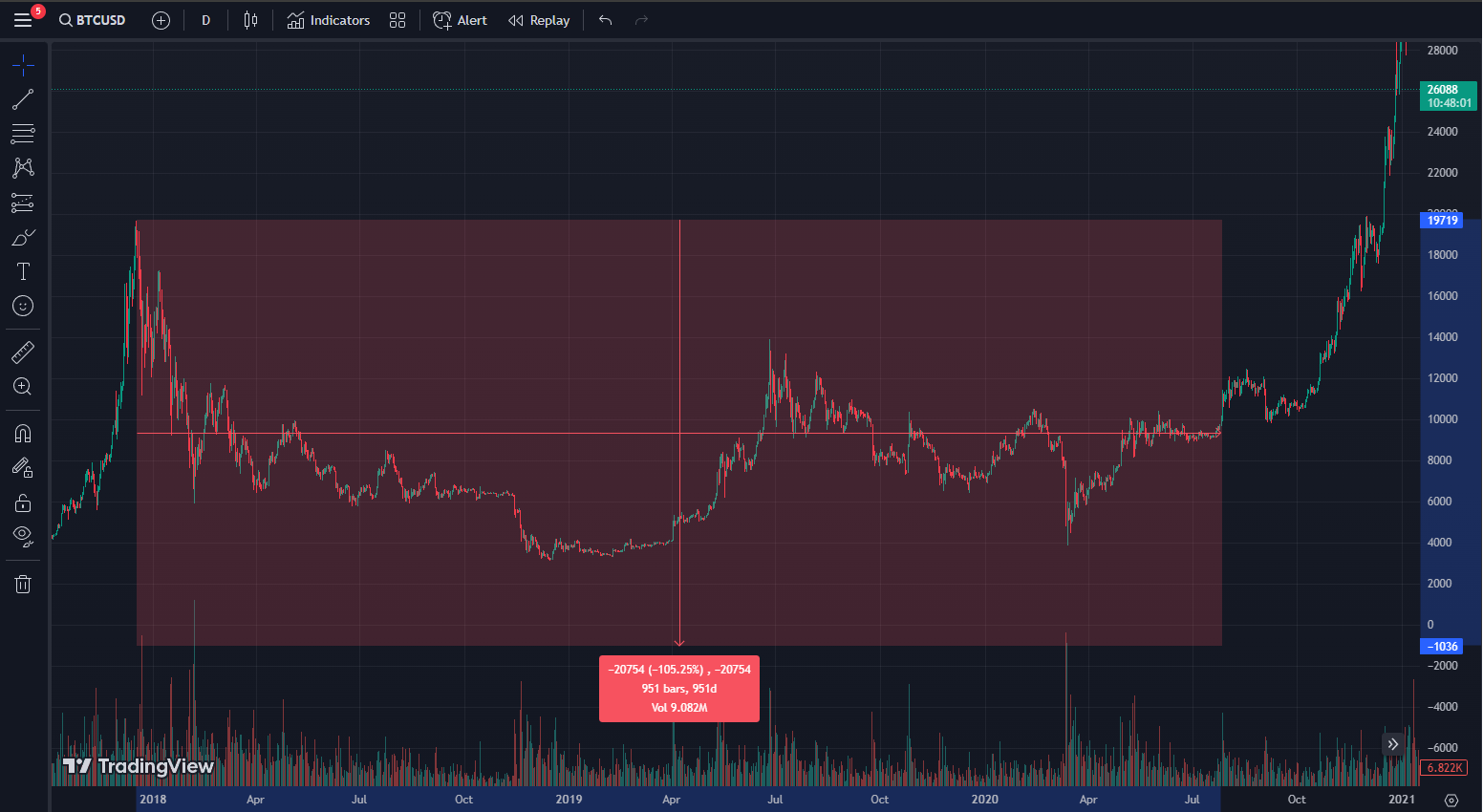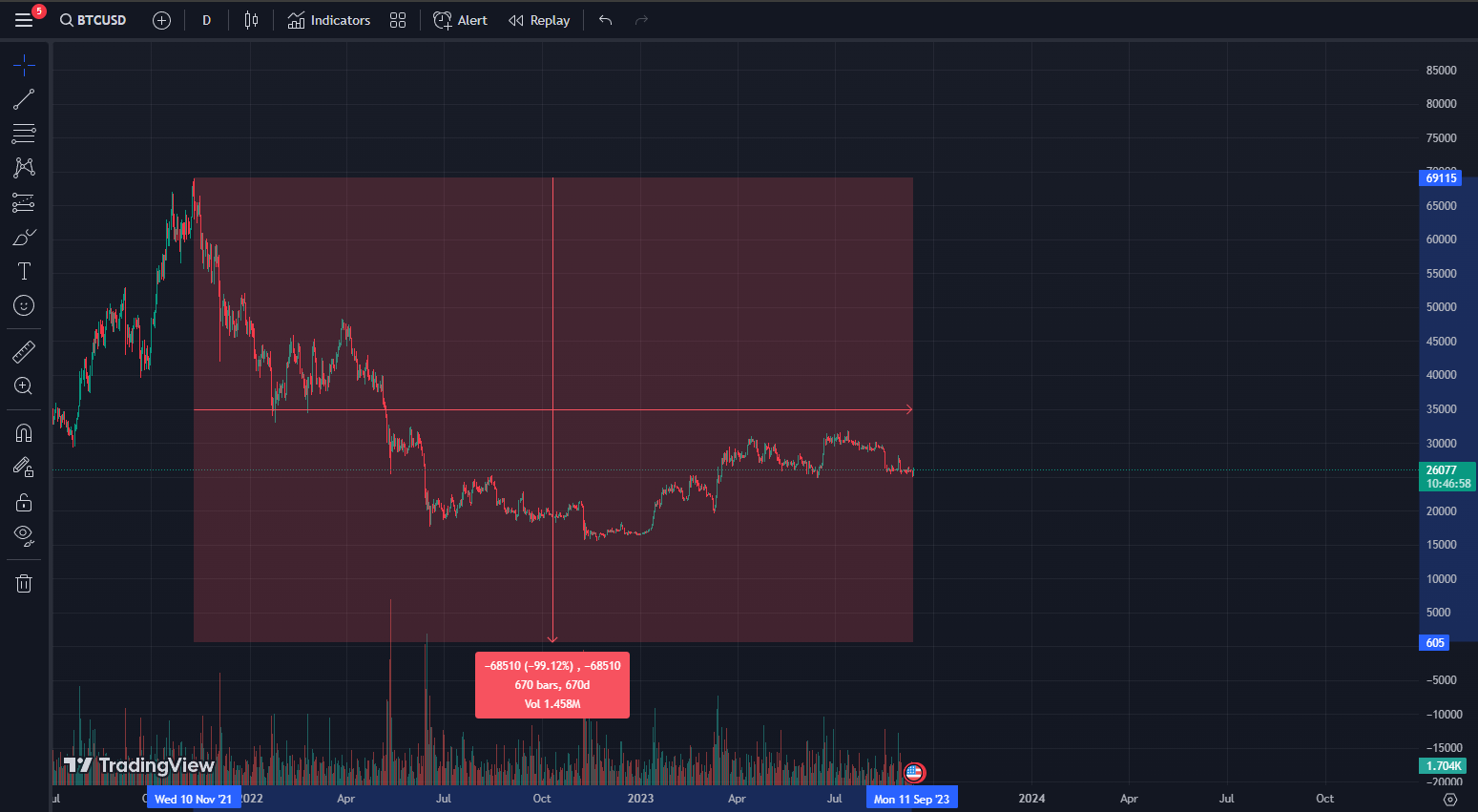'Unprecedented'?

We are hearing the word 'unprecedented' often when describing this bear market. We are also hearing this word in traditional markets and we hear it in many current events and news headlines and even in modern science and history. There seems to be an attraction to the idea of one's present being unprecedented in humanity's history, but there's more often than not a precedent and many similarities to draw from with most of these claims.
While there are specific aspects of this cycle that are indeed unlike others, is the bigger picture and price action really unprecedented from previous booms and busts? Or is the market psychology the same with some different details and backdrops? On a macro level, all that really matters is the underlying psychology of a market.
Let's look at the data and timeframes, specifically for Bitcoin/crypto, which we look at as a global barometer for risk appetite/aversion.

As seen above, the prior bull market peaked in December 2017 at around ~$20,000 BTC. It took nearly 3 years to confidently break out of a ~50% correction range. There were some peaks and troughs between and a breakout to $14,000 that failed but the price generally held down >50% from the highs most of the time.
The 2018/19 bear market had plenty of "end of crypto" narratives and comparable sentiment in our opinion – while many have claimed sentiment has never been worse. 'Crypto Twitter' (and social media in general) always has confirmation bias in the present. Not only was Crypto Twitter not as big and active in 2018/19, but the entire space was smaller. In relative terms, these markets have been psychologically nearly identical so far. We're going from despair to boring and dull indifference, which is when a stronger (and in our view, lower risk) buyer's market begins to materialize.

The latest bull market peaked in November 2021 at around $69,000 BTC. As of today, BTC is ~62% off the highs. It has been under 2 years (670 days) from the top.
To compare this timeframe to the 2017 cycle, 670 days after the ~$20,000 highs, BTC was still 55% off the highs. This is completely in the realm of what we're seeing today in terms of price action and timing, so far.
If Bitcoin is flat or down in a year from now (which, don't get us wrong, is completely plausible) then we can begin using the word unprecedented. The key difference this time is the macro backdrop and interest rate cycle, which could be a cause to prolong things. We will check back on this analysis in ~280 days. This is a substantial amount of time for market forces, sentiment, and macroeconomics to change.
For reference, working with simple raw data and percentages has been far more valuable than dwelling on moving averages and trying to read tea leaves with TA indicators. We place big narrative bets at market inflection points while analyzing risk – not scalp-trading invisible lines on low-timeframe charts.
OTHER THOUGHTS
Also similar to 2018/19's bear market, there is a lot of good news running in parallel in the space in terms of adoption and technology which are too numerous to list here. The market is brushing off all this good news, which is a clear sign of poor sentiment but also means that none of the positive developments are being priced in. A Bitcoin ETF is highly likely either by the end of 2023 or early 2024. We could see a run-up towards that event to begin pricing it in. Coincidentally as of writing this, yet another institutional Bitcoin Spot ETF registration was made by Franklin Templeton, which has $1.53T AUM. The market wants this product and will get it.
Regulatory risk, particularly around altcoins and exchanges, is certainly real but more likely than not, any major decisions will be made in Congress and we believe there is enough nuance and dissent on this topic to yield generally positive results with some exceptions. We also need to think about what can happen if the Senate turns Red in 2024 (White House/SEC change far less likely).
In our view, "Operation Chokepoint 2.0" is an overblown assessment of the current situation that falsely connects dots that don't exist. It's a cute analogy, but the theory hasn't really panned out as a big conspiracy. The majority of the ideological anti-crypto voices in government are coming from a handful of people like Elizabeth Warren and her acolytes and not as a general consensus. For context, in Warren's decade as a Senator, she has introduced 315 bills. Only one has been enacted into law (0.32% success rate). Progressives and Centrists within the Democrat Party certainly do not all agree on this topic, while the GOP has turned very pro-crypto. Gensler is certainly attacking crypto (not Bitcoin so much) but this is relatively compartmentalized in practice and bigger decisions will come down to actual legislation – which even he has admitted. Banks as crypto onramps are understandably de-risking in this market for now (as is every company in general) and many will be back when things are clearer and when crypto and risk are back on the menu (we are already seeing many institutions re-enter after the FTX aftershock). Let's also be honest that much of the criticism across crypto has been warranted, particularly post-FTX. Some are using it as an excuse to go too far and attack the technology at its core but most want sensible rules in place. In short, it's not a big conspiracy and crypto has always had enemies – some are being opportunistic now.
We are cautiously optimistic that when it comes down to Congress, they won't stifle innovation and companies like Coinbase will come out on top, minus some additional compliance and reporting they will be required to do (disclosure: we are long $COIN since early 2023) and potential penalties and/or delistings they will be able to endure. Companies like Binance (specifically their US arm) may be sacrificial lambs in this case and take much of the brunt – but we disagree with assertions their International entity is going to suddenly collapse like FTX. Areas like DeFi are a question mark and we will continue seeing increased enforcement there in parallel. Maintaining self-custody becomes the hill to die on, which is what separates this industry from traditional banking. That is the primary fight – while many other areas will likely legislate in some gray area that is workable.
As crypto came out of obscurity cycle after cycle, it was naïve to believe it would remain an underground technology – and ironically while people called for mass adoption simultaneously. Increased adoption was always going to come with a level of regulation and integration into existing frameworks (and hopefully new bespoke ones). In a perfect Libertarian fantasy, crypto could exist as a completely separate, pristine market, but this ignores the real "layer zero" of government, which will always exist in some form.
Stablecoins continue to emerge as a clear killer use-case that has massive positive network effects for the broader space. We have not even seen 10% of the potential here. Real World Assets (RWAs) on blockchains are also finally having a growth moment, as the previous branding of "Digital/Tokenized Securities" hadn't ever really taken off. RWAs can apply to more types of assets and particularly in a high interest rate world, blockchain-enabled, accessible yield in regulated onchain products becomes more interesting. More on these areas and more in following posts.
We will check back in on this post in ~9+ months to see if this market is truly 'unprecedented' or if market psychology is an unwavering force at large. In 2021, we had people telling us our posts sounded too cynical in such a good market (how did that pan out?) Now, perhaps we'll have people telling us our posts are starting to sound too optimistic (let's see how that pans out).
Our quarterly update will release in 2 weeks to review some more specific market analysis (private, public, and crypto) and moves we've made. Thank you for reading.
This Content is for informational purposes only, you should not construe any such information or other material as legal, tax, investment, financial, or other advice. Nothing contained on our Site constitutes a solicitation, recommendation, endorsement, or offer by Visary Capital or any third party service provider to buy or sell any securities or other financial instruments in this or in in any other jurisdiction in which such solicitation or offer would be unlawful under the securities laws of such jurisdiction.

